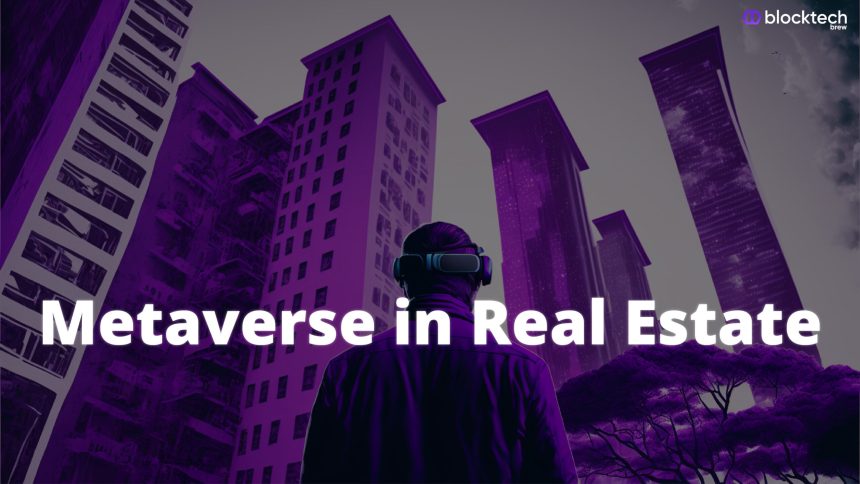In today’s digital age, everybody knows about blockchain, cryptocurrencies, and metaverse concepts. However, the knowledge of using them to build wealth and digital assets is still limited to a few.
It can be a rock-solid fact that many people would be unaware of the existence of real estate in the metaverse. So, in this blog, we will uncover all about the metaverse in the real estate industry, from what it is and how it is useful to applications and development.
What is Metaverse Real Estate?
Just like in the physical world, real estate in the metaverse revolves around individuals owning virtual land, which they can sell, rent, or develop to create revenue streams. This digital real estate is secured by the blockchain network, ensuring that all transactions are transparent, secure, and efficient.
Within the virtual realm, users are represented by avatars and can engage in experiences that may be challenging or impossible in the physical world. For instance, one can journey through outer space and explore various planets from the comfort of their home. Nowadays, the metaverse is utilized for socializing, education, training, mental health services, entertainment, and even shopping. Among these applications, the real estate sector remains largely untapped.
Key Features of Metaverse Real Estate
The features of metaverse real estate include:
Virtual Tours
Utilizing virtual reality technology, clients can take 360-degree tours of properties they are interested in. This benefits buyers by allowing them to examine the space closely while helping sellers enhance the experience for potential clients.
Virtual Design & Staging
Virtual design tools enable buyers to visualize and explore various interior design options for a property. Virtual staging allows them to see how furniture can be arranged and customized to meet their preferences.
Virtual Meetings and Walkthroughs
The metaverse hosts many social events, meet-ups, and walkthroughs, allowing individuals to network and collaborate effectively. These gatherings provide opportunities for real estate investment and encourage more entrants into the industry.
Virtual Property Sales
In the metaverse, users can buy, sell, and rent properties with cryptocurrency, free from the geographical constraints present in traditional real estate. This accessibility allows individuals from anywhere in the world to invest in virtual land.
Virtual Commercial Real Estate
Real estate agents can establish their commercial spaces or offices in the metaverse, launching new virtual ventures that can help them build their brand and reach a wider audience for revenue growth.
Virtual Property Management
Similar to the physical realm, managing virtual properties is essential. Tasks like maintenance scheduling, tenant communication, rent collection, property inspections, and data analysis must be carried out by property owners.
What are the Benefits of Metaverse Real Estate?
Metaverse real estate has transformed the conventional real estate landscape. Below are some key benefits:
Eliminates The Hassle of Physical Property Search
Purchasing property in the metaverse removes the challenges of navigating traffic, attending numerous showings, and deciphering complex housing plans. Instead, users can explore available properties comfortably from home.
Saves Realtors Time and Effort
Realtors often spend significant time arranging meetings, staging properties, and conducting showings, with only a fraction of visitors genuinely interested in buying. In the metaverse, clients can browse virtual properties on their devices, allowing interested parties to reach out for more information, thus saving time and effort for realtors.
Enhances Communication Between Real Estate Agents and Clients
Augmented reality (AR) applications foster real-time communication between property owners and prospective buyers. Clients can view AR models of properties and compare them easily, while agents can improve virtual presentations for better engagement.
Increases Sales Opportunities
Virtual staging is not only cost-effective but also allows for faster and more customizable options compared to physical staging. The immersive experience provided by 3D virtual tours can enhance buyer interest, ultimately boosting sales.
Offers Unlimited Design Possibilities
In the physical world, design options can be limited by spatial constraints. In contrast, metaverse real estate is free from such boundaries, enabling users to customize their spaces without the logistical challenges present in the real world.
Boosts Brand Exposure and Reputation
Real estate agencies that incorporate virtual reality technologies can generate significantly more leads by offering clients immersive experiences. This increased engagement builds client confidence in their purchases.
Real Estate Companies in Metaverse
According to Precedence Research, the metaverse real estate market was valued at USD 2.17 billion in 2023 and is anticipated to soar to USD 54.95 billion within the next decade. This remarkable growth underscores the potential of the metaverse real estate sector. Here are some companies leading the charge:
- Axie Infinity
- Cryptovoxels
- Decentraland Foundation
- Linden Lab
- ShibaLand LLC
- Somnium Space LTD.
- SuperWorld Inc.
- TandB Media Global Thailand Co. LTD.
How did these metaverse real estate companies ensure success?
Common factors that have contributed to the success of these leading firms include:
Early Adoption
Recognizing the potential of metaverse real estate early on has allowed these companies to capitalize on its growth and establish themselves in a relatively new field.
User-Friendly Platforms
Creating intuitive platforms encourages user participation and attracts a larger audience to metaverse real estate.
Virtual Economics
Integrating seamless cryptocurrency wallets into their platforms streamlines transactions, enhancing user experience and business success.
Creative Freedom
These companies promote user-generated content, enabling users to create and share virtual assets, experiences, and games.
Strong Market Recognition
Establishing a solid user base and forming strategic partnerships boosts market reputation, fostering trust among investors and users, which is vital for growth.
How Do You Build Real Estate In The Metaverse?
To build real estate in the metaverse, follow these essential steps:
Choose a Platform
Select a suitable platform by evaluating blockchain technology, smart contracts, decentralized finance, and NFTs. Consider building your metaverse from scratch, tailoring it to your vision and requirements.
Create a Metaverse Smart Contract
Drafting a smart contract is crucial as it outlines the terms and conditions governing transactions between buyers and sellers.
Install IPFS
The InterPlanetary File System (IPFS) serves as a decentralized storage solution for managing vast amounts of data related to virtual real estate transactions, including 3D models and images.
Set Up The Database
The next step involves establishing a database to manage and store data securely, ensuring efficient operations within the metaverse real estate framework.
“`






